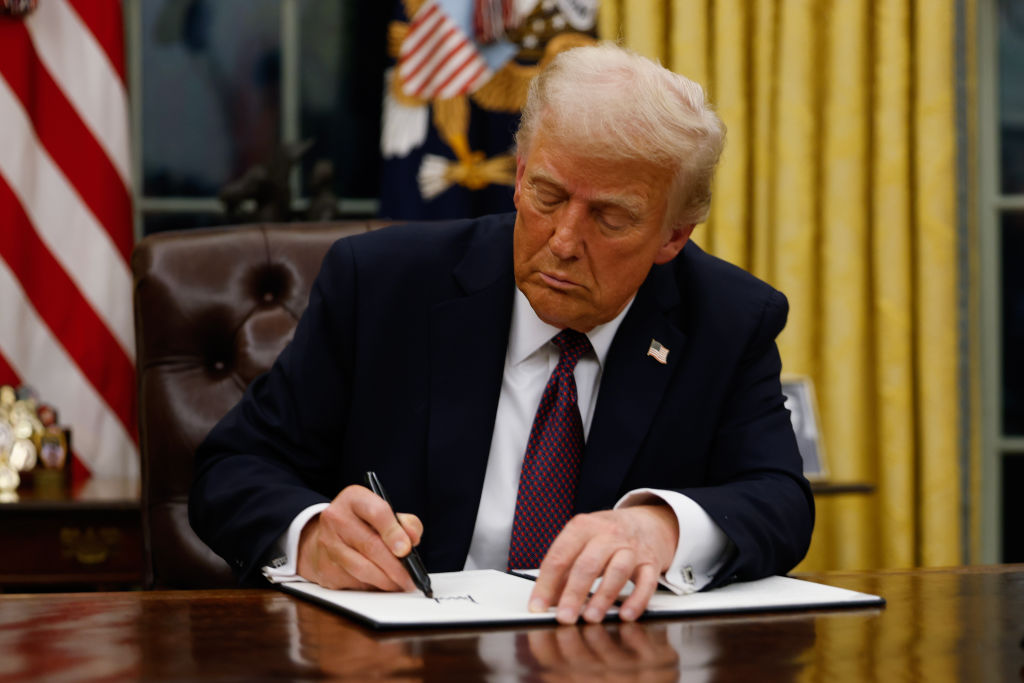North America is now engaged in a full-blown trade war. Markets are reacting. Japan’s Nikkei was the first to indicate the downturn, falling 2.9 per cent this morning, while early trading on the FTSE is down 1.1 per cent. It’s not the cataclysmic shock some were expecting, though also not the ‘FANTASTIC’ response the President insists has occurred since his announcements over the weekend, which include hitting Canada and Mexico with a 25 per cent import tariff, and China with an additional 10 per cent.
It is also just the start of market reaction, as forecasters pile in with predictions about what these tariffs mean for inflation, business confidence and future trade relationships between close allies. Wall Street has yet to open, but futures suggest a volatile day ahead in the United States, with Nasdaq 100 futures down 1.7 per cent and Dow Jones futures down 1.3 per cent.
Meanwhile, Goldman Sachs economists warn that stocks will continue to tumble. JPMorgan’s chief economist says Trump may be ‘business unfriendly’. Warnings swirl over the possibility of another inflation spike, as oil prices rise in the wake of Trump’s announcements on Canadian energy resources, which will be subject to a 10 per cent levy.
None of this is fazing the President – who is warning the country that ‘pain’ might be part of his journey to a new ‘golden era’ for America – but one he believes will be well worth it. But this weekend’s announcements, according to the President, are just the start. So where will Donald Trump set his sights next?
Europe is a likely contender for the next tariff announcement. Taxing the EU has been hinted at by the President for some time, though he did not include the bloc in his executive orders this weekend. But now that he has addressed his neighbours, he has stronger words for Europe.
‘The UK is way out of line, and we’ll see,’ was Trump’s response to reporters in Washington, D.C., when asked which country might next be hit by tariffs. ‘But (the) European Union is really out of line. The UK is out of line but I’m sure that one, I think that one can be worked out. But the European Union, it’s an atrocity what they’ve done.’
The addition of the UK to his list is new. The EU has largely been the President’s gripe, due to the significant trade deficit the United States has with the EU – around $200 billion in 2023 – and competition in particular manufacturing areas, especially the automotive industry. But thanks to technical number-crunching, the US (on paper, at least) has a trade surplus – a position Trump views favourably.
What might the UK have to do to keep out of the Trump trade wars? The simple decision to stay friendly might do the trick, if Britain is lucky. ‘Prime Minister Starmer’s been very nice,’ Trump told reporters. ‘We’ve had a couple of meetings, we’ve had numerous phone calls, we’re getting along very well, we’ll see whether or not we can balance out our budget.’ If the nice phone calls stop doing so much heavy lifting, the UK could find itself in far more pressing conversations with the United States over the trade relationship. In the most extreme case, this would involve discussions around agriculture: a sticking point for Trump when it comes to both the EU and the UK, which are heavily opposed to importing products like American chicken.
But the real challenge for Britain may be how to be friendly with both sides in a US–EU trade battle. In Brussels today, the Prime Minister is supposed to be ‘resetting’ relationships with the EU-27 by strategising on defence. But there is no doubt Trump will come to dominate these conversations – not simply because of the tariff threats, but because they are intrinsically tied, as well, to his calls for Nato states to increase their defence spending substantially (a goal the President may use tariffs to achieve).
That’s the thing about Trump: when he’s out of office, he is still the topic of conversation. And when he is in office, his agenda dominates every conversation.








Comments